
Finland, officially the Republic of Finland, is a Nordic country in Northern Europe. It borders Sweden to the northwest, Norway to the north, and Russia to the east, with the Gulf of Bothnia to the west and the Gulf of Finland to the south, across from Estonia. Finland covers an area of 338,455 square kilometres (130,678 sq mi) with a population of 5.6 million. Helsinki is the capital and largest city. The vast majority of the population are ethnic Finns. Finnish and Swedish are the official languages, Swedish is the native language of 5.2% of the population. Finland's climate varies from humid continental in the south to the boreal in the north. The land cover is primarily a boreal forest biome, with more than 180,000 recorded lakes.

Helsinki is the capital, primate, and most populous city of Finland. Located on the shore of the Gulf of Finland, it is the seat of the region of Uusimaa in southern Finland and has a population of 665,558. The city's urban area has a population of 1,268,296, making it by far the most populous urban area in Finland as well as the country's most important center for politics, education, finance, culture, and research. Helsinki is located 80 kilometres (50 mi) north of Tallinn, Estonia, 400 km (250 mi) east of Stockholm, Sweden, and 300 km (190 mi) west of Saint Petersburg, Russia. It has close historical ties with these three cities.
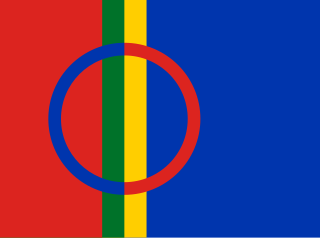
The Sámi are the traditionally Sámi-speaking people inhabiting the region of Sápmi, which today encompasses large northern parts of Norway, Sweden, Finland, and of the Kola Peninsula in Russia. The region of Sápmi was formerly known as Lapland, and the Sámi have historically been known in English as Lapps or Laplanders, but these terms are regarded as offensive by the Sámi, who prefer the area's name in their own languages, e.g. Northern Sámi Sápmi. Their traditional languages are the Sámi languages, which are classified as a branch of the Uralic language family.
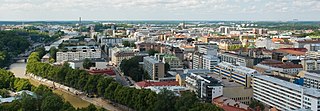
Turku is a city and former capital on the southwest coast of Finland at the mouth of the Aura River, in the region of Finland Proper (Varsinais-Suomi) and the former Turku and Pori Province. The region was originally called Suomi (Finland), which later became the name for the whole country. As of 31 March 2021, the population of Turku was 194,244 making it the sixth largest city in Finland after Helsinki, Espoo, Tampere, Vantaa and Oulu. There were 281,108 inhabitants living in the Turku Central Locality, ranking it as the third largest urban area in Finland after the Capital Region area and Tampere Central Locality. The city is officially bilingual as 5.2 percent of its population identify Swedish as a mother-tongue.
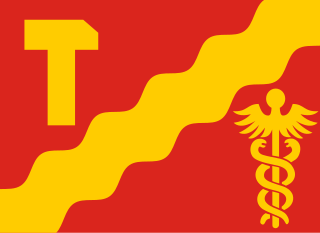
Tampere is a city in the Pirkanmaa region, located in the western part of Finland. Tampere is the most populous inland city in the Nordic countries. It has a population of 244,029; the urban area has a population of 341,696; and the metropolitan area, also known as the Tampere sub-region, has a population of 393,941 in an area of 4,970 km2 (1,920 sq mi). Tampere is the second-largest urban area and third most-populous individual municipality in Finland, after the cities of Helsinki and Espoo, and the most populous Finnish city outside the Greater Helsinki area. Today, Tampere is one of the major urban, economic, and cultural hubs in the whole inland region.

The University of Helsinki is a public research university located in Helsinki, Finland, since 1829, but founded in the city of Turku in 1640 as the Royal Academy of Åbo, at that time part of the Swedish Empire. It is the oldest and largest university in Finland with the widest range of disciplines available. In 2020, around 31,600 students were enrolled in the degree programs of the university spread across 11 faculties and 11 research institutes.

Erkki Sakari Tuomioja is a Finnish politician and a member of the Finnish Parliament. From 2000 to 2007 and 2011 to 2015, he served as the minister for foreign affairs. He was president of the Nordic Council in 2008.

Elsevier is a Dutch academic publishing company specializing in scientific, technical, and medical content. Its products include journals such as The Lancet, Cell, the ScienceDirect collection of electronic journals, Trends, the Current Opinion series, the online citation database Scopus, the SciVal tool for measuring research performance, the ClinicalKey search engine for clinicians, and the ClinicalPath evidence-based cancer care service. Elsevier's products and services include digital tools for data management, instruction, research analytics, and assessment.

Finns or Finnish people are a Baltic Finnic ethnic group native to Finland.
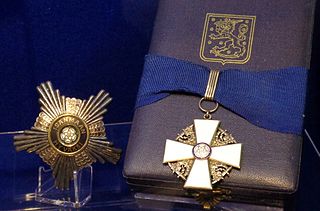
The Order of the White Rose of Finland is one of three official orders in Finland, along with the Order of the Cross of Liberty, and the Order of the Lion of Finland. The President of Finland is the Grand Master of all three orders. The orders are administered by boards consisting of a chancellor, a vice-chancellor and at least four members. The orders of the White Rose of Finland and the Lion of Finland have a joint board.

A national poet or national bard is a poet held by tradition and popular acclaim to represent the identity, beliefs and principles of a particular national culture. The national poet as culture hero is a long-standing symbol, to be distinguished from successive holders of a bureaucratically-appointed poet-laureate office. The idea and honoring of national poets emerged primarily during Romanticism, as a figure that helped consolidation of the nation states, as it provided validation of their ethno-linguistic groups.
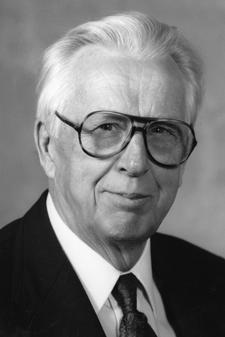
Verner Edward Suomi was a Finnish-American educator, inventor, and scientist. He is considered the father of satellite meteorology. He invented the Spin Scan Radiometer, which for many years was the instrument on the GOES weather satellites that generated the time sequences of cloud images seen on television weather shows. The Suomi NPP polar orbiting satellite, launched in 2011, was named in his honor.

Bengt Robert Holmström is a Finnish economist who is currently Paul A. Samuelson Professor of Economics (Emeritus) at the Massachusetts Institute of Technology. Together with Oliver Hart, he received the Central Bank of Sweden Nobel Memorial Prize in Economic Sciences in 2016.
MDPI is a publisher of open access scientific journals. Founded by Shu-Kun Lin as a chemical sample archive, it now publishes over 390 peer-reviewed, open access journals. MDPI is among the largest publishers in the world in terms of journal article output, and is the largest publisher of open access articles.
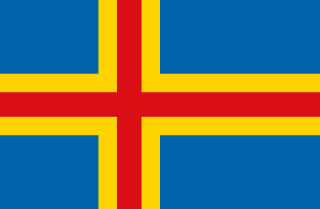
Åland is an autonomous and demilitarised region of Finland since 1920 by a decision of the League of Nations. It is the smallest region of Finland by area and population, with a size of 1,580 km2, and a population of 30,129, constituting 0.51% of its land area and 0.54% of its population. Its only official language is Swedish and the capital city is Mariehamn.

Sanna Mirella Marin is a Finnish politician who has served as Prime Minister of Finland since 2019, as member of Parliament for the Social Democratic Party of Finland (SDP) since 2015, and as leader of the SDP since 2020. As of 6 April 2023, after the 2023 Finnish parliamentary election in which the SDP placed third, Marin's government has formally resigned but will continue serving on a caretaker basis until the formation and appointment of a new government. Marin has stated she will resign as leader of the SDP at the 2023 party congress in autumn, but will remain a member of Parliament.
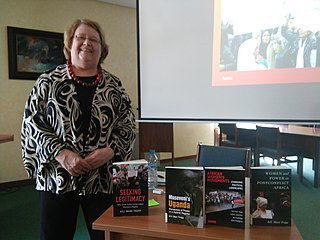
Aili Mari Tripp is a Finnish and American political scientist, currently the Wangari Maathai Professor of Political Science and Gender and Women's Studies at the University of Wisconsin-Madison.
Plan S is an initiative for open-access science publishing launched in 2018 by "cOAlition S", a consortium of national research agencies and funders from twelve European countries. The plan requires scientists and researchers who benefit from state-funded research organisations and institutions to publish their work in open repositories or in journals that are available to all by 2021. The "S" stands for "shock".
Christina Salmivalli is a Finnish professor of psychology and the deputy head of the INVEST research flagship at the University of Turku in Finland. Salmivalli is recognized as an expert on peer relations and school bullying.















